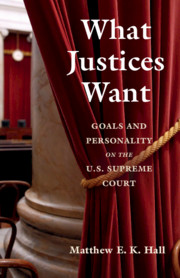Book contents
- Frontmatter
- Dedication
- Contents
- List of Figures
- List of Tables
- Acknowledgments
- 1 Who They Are and What They Want
- 2 Goals and Personality
- 3 Measuring Justice Personality
- 4 Agenda Setting
- 5 Opinion Assignments
- 6 Intra-Court Bargaining
- 7 Voting on the Merits
- 8 Separate Opinions
- 9 Behind the Black Robes
- Appendix A Agenda-Setting Analysis
- Appendix B Opinion Assignment Analysis
- Appendix C Intra-Court Bargaining Analysis
- Appendix D Voting on the Merits Analysis
- Appendix E Separate Opinion Analysis
- Notes
- Index
4 - Agenda Setting
Published online by Cambridge University Press: 22 August 2018
- Frontmatter
- Dedication
- Contents
- List of Figures
- List of Tables
- Acknowledgments
- 1 Who They Are and What They Want
- 2 Goals and Personality
- 3 Measuring Justice Personality
- 4 Agenda Setting
- 5 Opinion Assignments
- 6 Intra-Court Bargaining
- 7 Voting on the Merits
- 8 Separate Opinions
- 9 Behind the Black Robes
- Appendix A Agenda-Setting Analysis
- Appendix B Opinion Assignment Analysis
- Appendix C Intra-Court Bargaining Analysis
- Appendix D Voting on the Merits Analysis
- Appendix E Separate Opinion Analysis
- Notes
- Index
Summary
In 1954, the Supreme Court issued its landmark decision in Brown v. Board of Education, ruling that racially segregated schools are unconstitutional. In the decision's wake, Southern states and localities initiated a variety of policies designed to avoid desegregation without openly defying the Court's ruling. One of the most popular methods of resisting desegregation was the adoption of a pupil placement plan, which granted local officials “practically unreviewable discretion” to assign individual students to local schools. These laws authorized school administrators to place students in specific schools based on a wide variety of racially neutral criteria, such as residence, psychological fitness, scholastic aptitude, health, and moral standards. Because placement plans allowed so many factors to be considered in student assignment, it was nearly impossible to prove that a specific student's assignment to a specific school was racially motivated. And, because the plans purported to utilize individual treatment, it was extremely difficult to bring a class-action suit challenging these laws.
When the parents of African American students in Sumter City, South Carolina, did bring a suit challenging a pupil placement plan, the South Carolina legislature erected an additional legal hurdle designed to impede their case. After a trial court initially denied relief to the parents in 1956, the legislature passed a new law prescribing additional administrative remedies for such lawsuits. Consequently, when the parents appealed their case to the Fourth Circuit Court of Appeals in Hood v. Board of Trustees, the federal court denied the appeal on the grounds that they had not yet exhausted their options under state law. Dissatisfied with the Fourth Circuit's ruling, the parents filed a petition for a writ of certiorari to the US Supreme Court. They argued that, rather than offering a potential remedy, the new South Carolina law was actually a transparent device with which the state hoped to evade judicial oversight and enforcement of the Brown decision.
The Fourth Circuit's ruling in Hood was well-grounded in the law: Petitioners must generally exhaust their options in state court before appealing to a federal court for relief.
- Type
- Chapter
- Information
- What Justices WantGoals and Personality on the U.S. Supreme Court, pp. 50 - 67Publisher: Cambridge University PressPrint publication year: 2018



